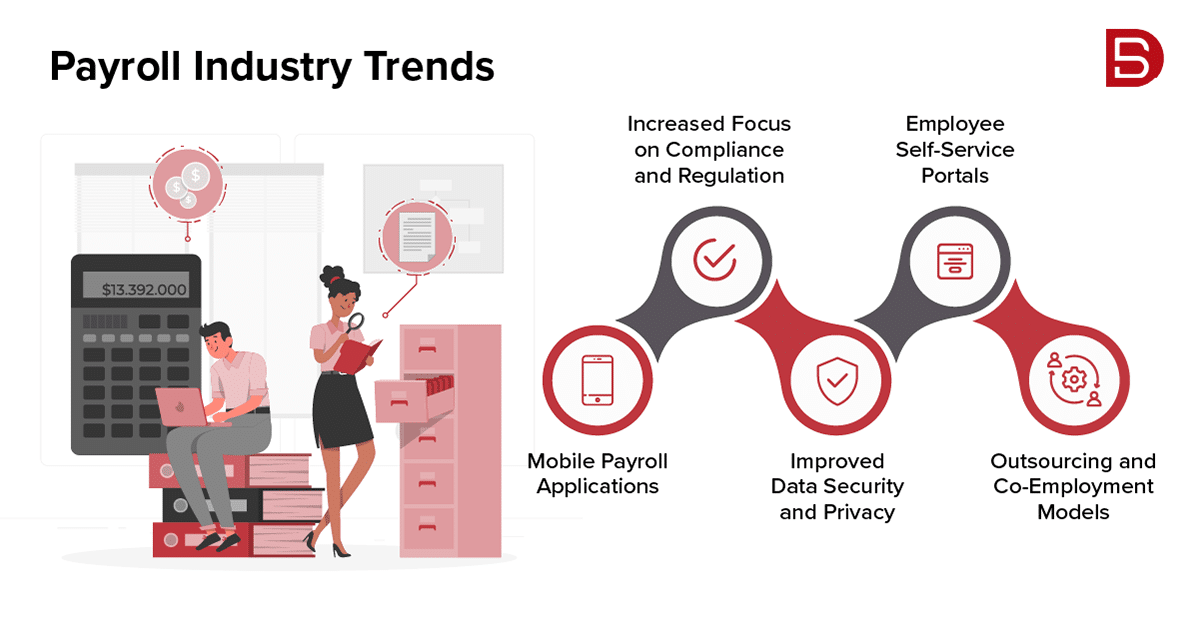Table of Contents
Introduction
Automation and Artificial Intelligence seem to be the modern equivalent of “Midas’ touch,” for these technological advancements carry the power to revolutionize every industry they come in touch with. The integration of automation and artificial intelligence (AI) can be seen profoundly in our everyday lives.
This indicates that sectors have embraced these technological advancements with open arms, from transforming their day-to-day operations to streamlining the more intricate and time-consuming processes of managing employee compensation. If the transformative payroll industry trends are anything to go by, automation and artificial intelligence have made deep inroads into the payroll processing industry, and we will see some remarkable transformations as the technology develops.
Welcome to our blog on “Automation and Artificial Intelligence: Key Transformative Payroll Industry Trends.” This blog delves into the advancements in cutting-edge technologies and the payroll landscape. Once considered an intricate and time-consuming process, payroll processing has come a long way since then. It is no longer a process marred by manual calculations and paperwork. The modern payroll processing is sophisticated, accurate, and fast, thanks to the digital systems.
As we embark on this insightful journey, we will go through the evolution of payroll processing over time and will take a glimpse into the payroll industry trends for the future. We will look at some of the biggest challenges modern organizations face when it comes to payroll management and how technology helps them conquer those challenges. So, let us begin our journey into the world of contemporary payroll management.
Current State of Payroll Industry
The current landscape of the payroll industry has undergone a severe transformation since the old paper-based payroll processing days. The evolution of payroll industry trends with the advancement in payroll processing technologies has made the overall landscape much more compliant and efficient.
Here are some of the dominant payroll industry trends that are currently dominating the payroll industry:

• Mobile Payroll Applications:
The emergence of mobile payroll applications has been widely applauded by employees and employers. These payroll apps allow employees to access their payroll data, such as pay stubs and tax documents, on their smartphones, making it more transparent and convenient.
• Increased Focus on Compliance and Regulation:
Technology has also made the payroll processing industry more compliant with tax and labor regulations. The payroll service providers keep themselves updated on the global and regional tax laws, labor laws, etc. to adhere to legal requirements and avoid penalties.
• Improved Data Security and Privacy:
The employees’ payroll data contain sensitive information, making data security a top priority for the service providers. Payroll processing companies have also started investing heavily in implementing robust cybersecurity measures, regular security audits, and encryption technologies to safeguard their employee data from malicious breaches and cyber threats.
• Employee Self-Service Portals:
Employee Self-Service Portals are a great example of a modern payroll process influenced by technology. These portals allow employees to manage their personal information, tax information, and direct deposit details on one portal. This self-service approach significantly reduces the administrative burden on HR departments.
• Outsourcing and Co-Employment Models:
Many modern businesses also opt for outsourced payroll services and co-employment models. This arrangement allows them to focus on their core activities while leaving the compliance and payroll processing to experts.
While these are not all the payroll industry trends currently shaping the industry, the aforementioned ones are some of the most important ones. In the subsequent section of the blog, we will look at how automation and artificial intelligence (AI) have emerged as critical transformative trends for the payroll industry.
Automation and Artificial Intelligence (AI) Driven Trends in Payroll Industry
The widespread adoption of automation and artificial intelligence in the payroll industry is a paradigm shift transforming workforce management for businesses of all sizes. We are already seeing some crucial payroll industry trends shaping up with automation and artificial intelligence advancements.
Here are some of the pivotal trends driven by automation and AI that we feel are transforming the payroll industry:
• Demand Forecasting using Predictive Analytics
The vast computational power of AI algorithms allows firms to analyze their historical payroll data to predict future workforce needs. Identifying these patterns and trends will enable businesses to anticipate fluctuations in staffing requirements, allowing for better workforce management and budget allocation.
• Automating Repetitive Tasks using Robotic Process Automation (RPA):
Robotic Process Automation (RPA) can automate repetitive and mundane payroll tasks such as timesheet processing, data entry, and payroll calculations. This reduces manual errors in payroll processing and significantly improves the efficiency of the HR teams while allowing them to focus on strategic initiatives rather than administrative tasks.
• Natural Language Processing (NLP) for Employee Queries:
The use of NLP-powered chatbots and virtual assistants for handling employee queries is on the rise. These systems can understand natural language, responding instantly to common employee queries. This not only increases the satisfaction levels of employees and minimizes the burden on HR staff.
• Fraud Detection Using Machine Learning Algorithms:
Many modern firms use Machine learning algorithms to analyze payroll data to flag any irregularities or anomalies. This allows them to identify any fraudulent activity beforehand and mitigate risks before they escalate, making them safeguard their financial integrity.
• Talent Management using AI-Powered Predictive Analytics:
AI-powered predictive analytics tools can be used for assessing payroll data together with several other HR metrics for identifying high-performing employees, employee retention strategies, and potential areas for skills development. This insight is handy for talent management, ensuring the organization retains and nurtures its top talent.
• Personalized Compensation Offers using AI:
AI algorithms can analyze employee performance, market trends, and skills. The insights from such analysis can then be used for tailoring personalized compensation offers to match the candidate. This approach can help businesses attract top talent from the market and gain a competitive advantage in the job market.
To sum up, these automation and AI-powered payroll industry trends not only give a competitive edge to the employers in the market but also serve well in the interest of employees. If, as an employer, you are looking to transform your payroll function, these are some of the payroll industry trends that you can capitalize on.
Conclusion
To conclude the post, all the aforementioned automation and artificial intelligence-driven payroll industry trends highlight the immense innovation shaping the modern payroll industry. While advancements in technology have streamlined several processes, making them more efficient and accurate, they have also been instrumental in boosting the overall employee experience and compliance.
If you want to transform your payroll function using technology, we have the complete suite of services to meet your requirements. Just write to us at marketing@datamaticsbpm.com, and we will have our experts reach out to you with the right solution for your business.
